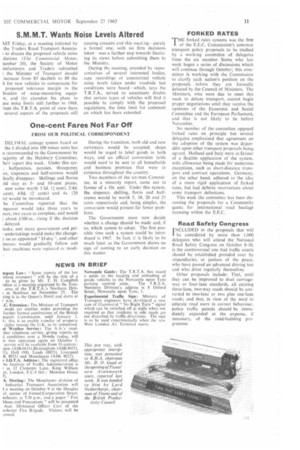FORKED RATES T HE forked rates systems was the first of
Page 15

If you've noticed an error in this article please click here to report it so we can fix it.
the E.E.C. Commission's common transport policy proposals to be studied by a working committee of delegates from the six member States who 'last week began a series of discussions which will continue through October; this committee is working with the Commission to clarify each nation's position on the proposals before they are formally debated by the Council of Ministers. The Ministers, who were due to meet this week to debate transport, cannot begin proper negotiations until they receive the opinions of the Economic and Social Committee and the European Parliament, and that is not likely to be before November.
No member of the committee opposed forked rates on principle but several delegates emphasized that agreement on the adoption of the system was dependent upon other transport proposals being agreed. Holland and Italy were in favour of a flexible application of the system, with allowance being made for numerous exceptions, such as short-distance transport and contract operations. Germany, on the other hand, adhered to the idea of a more rigid application of forked rates, but had definite reservations about some transport definitions.
This week the committee has been discussing the proposals for a Community quota for international road haulage licensing within the F.E.C.
Road Safety Congress
INCLUDED in the proposals that will L be considered by more than 1,000 delegates who will attend the National Road Safety Congress on October 8-10, is the controversial one that traffic courts should be established presided over by stipendiaries, or justices of the peace, who have passed an advanced driving test and who drive regularly themselves.
Other proposals include; That, until they can be improved to dual carriageway or four-lane standards, all existing three-lane, two-way roads should be converted to two-lane or two plus one-lane roads; and that, in view of the need to educate road users in correct behaviour, police traffic patrols should be immediately expanded at the expense, if necessary, of the road-building programme.






















































































































